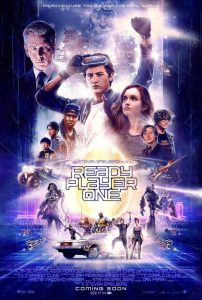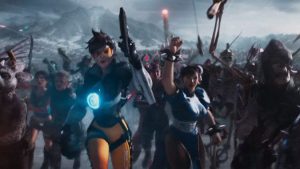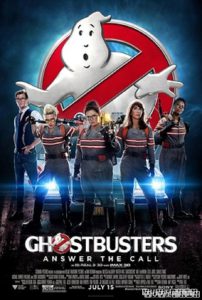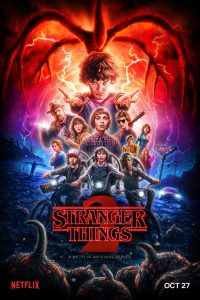 From Mav: This weekend I got a chance to see the film Ready Player One. As I said when I wrote my review of it (if you don’t read my movie reviews on my personal blog site, you absolutely should) I had not actually read the book before, though I’ve been meaning to and i’m sure I’ll get to it eventually. I don’t think it’s really a spoiler to tell people that the base premise of the entire book (and film) involves a heavy dose of nostalgia. Basically, it’s about a virtual game world based on popular culture references from 1980s-through 2000s… usually from very geeky things. This got me thinking a lot about the concept of nostalgia in media and so that’s what we’re going to talk about on our second show.
From Mav: This weekend I got a chance to see the film Ready Player One. As I said when I wrote my review of it (if you don’t read my movie reviews on my personal blog site, you absolutely should) I had not actually read the book before, though I’ve been meaning to and i’m sure I’ll get to it eventually. I don’t think it’s really a spoiler to tell people that the base premise of the entire book (and film) involves a heavy dose of nostalgia. Basically, it’s about a virtual game world based on popular culture references from 1980s-through 2000s… usually from very geeky things. This got me thinking a lot about the concept of nostalgia in media and so that’s what we’re going to talk about on our second show.
(yes, I know that the first show isn’t out yet when you’re reading this. But that’s ok. We want to sort of stagger things, so we’re trying to get a couple done before we start releasing them)
 People complain a lot about “nostalgia porn.” But we also seem to love it. In my mind there are a few different flavors of this. The first is the obvious. Stuff like Ready Player One that is specifically geared to wrap up an easter egg hunt in a loose narrative. Whether you like the movie (or the book) or not is almost irrelevant. It’s far more important to play game of “can you spot the memberberries?” That’s the whole fun of it.
People complain a lot about “nostalgia porn.” But we also seem to love it. In my mind there are a few different flavors of this. The first is the obvious. Stuff like Ready Player One that is specifically geared to wrap up an easter egg hunt in a loose narrative. Whether you like the movie (or the book) or not is almost irrelevant. It’s far more important to play game of “can you spot the memberberries?” That’s the whole fun of it.
The second is the franchise/reboot. This isn’t so much a game of “hide the easter egg” as it is “hey… you liked that thing before, so why don’t we give it to you again?” This happens a lot with Hollywood movie franchises. Since Hollywood is risk averse, the idea is that if something has a guaranteed profit return because you know there are already fans, might as well toss it out there and make some money. Sometimes this means making a version of something that wasn’t really a movie the first time but has a built-in fanbase for other reasons.
This isn’t always bad. A lot of comic book superheroes films fall in this category. Sometimes it works less well, like with the GI Joe and Transformers films, where story came second… at best… so long as the geeks pay to see their toys on screen. But even Star Wars movies fit in here. I wouldn’t necessarily count ALL franchises. Fast and Furious for instance, never really “stopped.” It’s just an ongoing story. This is more about products that are designed to return you to the past.
 One question I always have to ask myself on any franchise movie, especially a rebooted franchise is “would I care about this story if it wasn’t connected by word of god to something else I already love?” This was my big question with the 2016 Ghostbusters reboot. Why did this movie exist? Would anyone have cared about it at all if it were called “Spirit Hunters”? My friend Link argued that it was important because “little girls of today need Ghostbusters to look up to just like we had as kids.” But, my question is why? Why should little kids of today care about remakes of our childhood popular culture? I do agree that it’s important for children to have heroes. And I especially agree that it’s important to have more crossover content aimed at young girls especially. But why should it be a copy of content that was created for us? Or, that is to say, when I was a kid, we got the original Ghostbusters movies… not a remake of Bedknobs and Broomsticks. The reason is, because we don’t really seem to care about “new content for girls” as much as we wanted to pretend. That was secondary to “give me more of that thing I like!”
One question I always have to ask myself on any franchise movie, especially a rebooted franchise is “would I care about this story if it wasn’t connected by word of god to something else I already love?” This was my big question with the 2016 Ghostbusters reboot. Why did this movie exist? Would anyone have cared about it at all if it were called “Spirit Hunters”? My friend Link argued that it was important because “little girls of today need Ghostbusters to look up to just like we had as kids.” But, my question is why? Why should little kids of today care about remakes of our childhood popular culture? I do agree that it’s important for children to have heroes. And I especially agree that it’s important to have more crossover content aimed at young girls especially. But why should it be a copy of content that was created for us? Or, that is to say, when I was a kid, we got the original Ghostbusters movies… not a remake of Bedknobs and Broomsticks. The reason is, because we don’t really seem to care about “new content for girls” as much as we wanted to pretend. That was secondary to “give me more of that thing I like!”

The final is the spiritual homage. Not so much a specific recreation of something that exists… but instead a new story that is designed to evoke the tone and feeling associated with the thing we’re nostalgic for. This is where Stranger Things lives, as does my favorite movie of last year, Lady Bird. The idea is to take you back to the magical time that was the 1980s (or whenever). In order to really drive it home, maybe they drop lots of random references to things of the time period that would actually be pretty mundane at the time and not worth mentioning… but you want people to know you know you’re in the time period.. (“Hey, you want to come over and play some ATARI… I just got that new game PITFALL!”)
They’re not realistic visions, but we do it for a reason. We like these films for the same reason we like to do this in real life. There is comfort in remember the good parts of the past and editing out the bad. It’s why the president can go out there and trumpet (get it?) “Make America Great Again.” He’s looking back at the time when he was a child and America “seemed great” because he doesn’t remember (or wasn’t aware) of the massive atrocities that were occurring at the time. We take comfort in nostalgic media because we love the media that made us feel good at the time. Trump remembers the 1950s-60s that were portrayed on Leave it to Beaver… not the one with the civil rights riots, the Bay of Pigs or the assassinations of MLK and JFK. In the same way, we children of the 80s love Stranger Things because we prefer to prefer to remember a world of E.T.s and Goonies instead of the one that had Iran Contra Affair, space shuttle explosions and the AIDS outbreak.
The forms can of course be mixed. And I think they spiritual homages maybe rely on this most of all, since they don’t have specific built in memberberry visuals the way easter egg hunts and franchise reboots do. Stranger Things for instance relies heavily on visual similarities and homage scenes that recall 80s classics and inch it closer to the easter egg hunt.
The criticism right now is that we live in a nostalgia driven culture all of a sudden, and people point to Stranger Things as a prime example. There is a worry that if all we do is recreation culture of the past then we won’t have out own culture in the future. Sometimes I even worry about this. If I look back at the biggest movies of the 2010s twenty years from now, am I going to say “a bunch of remakes of stuff from the 80s and 90s?” But that’s not really fair. This isn’t new. We’ve always done this. Throwbacks… period pieces… we’ve always looked back on the past with rose colored lenses. That’s what Happy Days was in the 1970s. That’s what every western was in the 1950s. Even the 1936 novel Gone With the Wind is really just fondly looking back at the reconstruction era from sixty years earlier.
But there certainly is an art to remixing nostalgia. It doesn’t always work. A lot of it is simply bad. But there’s new content out there. And I think there is something to be said for finding a way to connect new content to old content. There’s an intertextuality that can connect the current cultural moment to the past and lend insight. Sometimes this might be as simply as a visual nod to something of another time that lets us know that we’re not all that different from the people of the past. Maybe it’s comforting. Maybe it’s just fun. I don’t know how many times I’ve seen homage remakes of the movie poster to The Breakfast Club applied to something else, but I love it every single time.
From Wayne: Unlike Mav I have not seen Ready Player One. I have read the book, which, while I was reading it, I thoroughly enjoyed the experience. I have no idea if it’s a good book or not. My enjoyment came purely from the sense of recognition I had. ‟Hey, I remember playing that! I would never have thought of that game again.” It hit the pleasure centers of recognition of something I once enjoyed. But, then it was over. As much as I remember enjoying the book I don’t really remember anything about it other than it being full of Easter Eggs that I had found. While it played with my feelings of nostalgia there is nothing about the book I will ever feel nostalgic about.
 So what is nostalgia anyway? The dictionary says it is, ‟a sentimental longing or wistful affection for the past, typically for a period or place with happy personal associations.” That’s part of it, but there seem to be other things at work. When I was a teen in the 70s a relative of mine got way into the wave of 50s nostalgia… American Graffiti, Happy Days, etc. While I was listening to Alice Cooper and KISS he was getting into the Four Seasons and Bill Haley. To this day his interest in Pop Culture ends somewhere around the early 1960s, a time that predates his existence. He has nostalgia for a time he never actually experienced in real life, just through the media representations of it. Happy Days never really dealt with the Civil Rights movement, or the Cold War. Nostalgia convinces us that Once Upon a Time things were better, or at least were less complicated. Nostalgia is a liar.
So what is nostalgia anyway? The dictionary says it is, ‟a sentimental longing or wistful affection for the past, typically for a period or place with happy personal associations.” That’s part of it, but there seem to be other things at work. When I was a teen in the 70s a relative of mine got way into the wave of 50s nostalgia… American Graffiti, Happy Days, etc. While I was listening to Alice Cooper and KISS he was getting into the Four Seasons and Bill Haley. To this day his interest in Pop Culture ends somewhere around the early 1960s, a time that predates his existence. He has nostalgia for a time he never actually experienced in real life, just through the media representations of it. Happy Days never really dealt with the Civil Rights movement, or the Cold War. Nostalgia convinces us that Once Upon a Time things were better, or at least were less complicated. Nostalgia is a liar.
I’ve heard it said that whatever music you discover when you are twelve will be the music you listen to for the rest of your life. I think that expands out to include all Pop Culture. When we argue that things used to be better than they are now I think what we’re really saying is, ‟I wish I was twelve again.”
I’ve a lot more to say on various aspects of this topic, but that’s what the podcast is for. Let us know what what you think, and join us as we ruin your childhood. I’ll leave you with a quote from a Bauhaus song called ‟Who Killed Mr. Moonlight?”
‟Someone shot nostalgia in the back. Someone shot our innocence.”
From Mav: So I guess my question is what do you think of nostalgia? Do you hate it? Do you love it? Why do you think it works? Is it a clever way of connecting with the past or just total cultural bankruptcy? Let us know your thoughts and we’ll address them here and on a future episode of Vox Popcast.
Related
Call for Comments: Do you remember nostalgia?
April 5, 2018
(yes, I know that the first show isn’t out yet when you’re reading this. But that’s ok. We want to sort of stagger things, so we’re trying to get a couple done before we start releasing them)
The second is the franchise/reboot. This isn’t so much a game of “hide the easter egg” as it is “hey… you liked that thing before, so why don’t we give it to you again?” This happens a lot with Hollywood movie franchises. Since Hollywood is risk averse, the idea is that if something has a guaranteed profit return because you know there are already fans, might as well toss it out there and make some money. Sometimes this means making a version of something that wasn’t really a movie the first time but has a built-in fanbase for other reasons.
This isn’t always bad. A lot of comic book superheroes films fall in this category. Sometimes it works less well, like with the GI Joe and Transformers films, where story came second… at best… so long as the geeks pay to see their toys on screen. But even Star Wars movies fit in here. I wouldn’t necessarily count ALL franchises. Fast and Furious for instance, never really “stopped.” It’s just an ongoing story. This is more about products that are designed to return you to the past.
The final is the spiritual homage. Not so much a specific recreation of something that exists… but instead a new story that is designed to evoke the tone and feeling associated with the thing we’re nostalgic for. This is where Stranger Things lives, as does my favorite movie of last year, Lady Bird. The idea is to take you back to the magical time that was the 1980s (or whenever). In order to really drive it home, maybe they drop lots of random references to things of the time period that would actually be pretty mundane at the time and not worth mentioning… but you want people to know you know you’re in the time period.. (“Hey, you want to come over and play some ATARI… I just got that new game PITFALL!”)
They’re not realistic visions, but we do it for a reason. We like these films for the same reason we like to do this in real life. There is comfort in remember the good parts of the past and editing out the bad. It’s why the president can go out there and trumpet (get it?) “Make America Great Again.” He’s looking back at the time when he was a child and America “seemed great” because he doesn’t remember (or wasn’t aware) of the massive atrocities that were occurring at the time. We take comfort in nostalgic media because we love the media that made us feel good at the time. Trump remembers the 1950s-60s that were portrayed on Leave it to Beaver… not the one with the civil rights riots, the Bay of Pigs or the assassinations of MLK and JFK. In the same way, we children of the 80s love Stranger Things because we prefer to prefer to remember a world of E.T.s and Goonies instead of the one that had Iran Contra Affair, space shuttle explosions and the AIDS outbreak.
The forms can of course be mixed. And I think they spiritual homages maybe rely on this most of all, since they don’t have specific built in memberberry visuals the way easter egg hunts and franchise reboots do. Stranger Things for instance relies heavily on visual similarities and homage scenes that recall 80s classics and inch it closer to the easter egg hunt.
The criticism right now is that we live in a nostalgia driven culture all of a sudden, and people point to Stranger Things as a prime example. There is a worry that if all we do is recreation culture of the past then we won’t have out own culture in the future. Sometimes I even worry about this. If I look back at the biggest movies of the 2010s twenty years from now, am I going to say “a bunch of remakes of stuff from the 80s and 90s?” But that’s not really fair. This isn’t new. We’ve always done this. Throwbacks… period pieces… we’ve always looked back on the past with rose colored lenses. That’s what Happy Days was in the 1970s. That’s what every western was in the 1950s. Even the 1936 novel Gone With the Wind is really just fondly looking back at the reconstruction era from sixty years earlier.
But there certainly is an art to remixing nostalgia. It doesn’t always work. A lot of it is simply bad. But there’s new content out there. And I think there is something to be said for finding a way to connect new content to old content. There’s an intertextuality that can connect the current cultural moment to the past and lend insight. Sometimes this might be as simply as a visual nod to something of another time that lets us know that we’re not all that different from the people of the past. Maybe it’s comforting. Maybe it’s just fun. I don’t know how many times I’ve seen homage remakes of the movie poster to The Breakfast Club applied to something else, but I love it every single time.
From Wayne: Unlike Mav I have not seen Ready Player One. I have read the book, which, while I was reading it, I thoroughly enjoyed the experience. I have no idea if it’s a good book or not. My enjoyment came purely from the sense of recognition I had. ‟Hey, I remember playing that! I would never have thought of that game again.” It hit the pleasure centers of recognition of something I once enjoyed. But, then it was over. As much as I remember enjoying the book I don’t really remember anything about it other than it being full of Easter Eggs that I had found. While it played with my feelings of nostalgia there is nothing about the book I will ever feel nostalgic about.
I’ve heard it said that whatever music you discover when you are twelve will be the music you listen to for the rest of your life. I think that expands out to include all Pop Culture. When we argue that things used to be better than they are now I think what we’re really saying is, ‟I wish I was twelve again.”
I’ve a lot more to say on various aspects of this topic, but that’s what the podcast is for. Let us know what what you think, and join us as we ruin your childhood. I’ll leave you with a quote from a Bauhaus song called ‟Who Killed Mr. Moonlight?”
From Mav: So I guess my question is what do you think of nostalgia? Do you hate it? Do you love it? Why do you think it works? Is it a clever way of connecting with the past or just total cultural bankruptcy? Let us know your thoughts and we’ll address them here and on a future episode of Vox Popcast.
Related articles
Share this:
Related